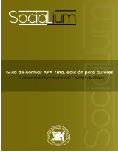Social and cultural factors condition chronic malnutrition in children 3 to 5 years of age attached micro network of Chupaca
DOI:
https://doi.org/10.26490/uncp.sl.2020.4.2.666Keywords:
Malnourished children, social factors, cultural factorsAbstract
Social and cultural factors are very important in the lives of human beings because the health situation of individuals depends on them, especially when child malnutrition is recorded as a primary problem of public health and child welfare, the consequences are fatal in the medium and long term. The objective of the research was: To identify the social and cultural factors that condition chronic malnutrition in children from 3 to 5 years of age enrolled in the Chupaca health micro network; basic research type, descriptive level, transactional design, the population was 700 mothers with children in a state of chronic malnutrition, the sample was 70 mothers, the instrument was the questionnaire. The results show that 40% of the mothers have completed secondary education, 51.42% live in overcrowded conditions and only have electricity, 91.42% have income above 950.00 soles, and 80.01% of the mothers have beliefs that contribute to the malnutrition of their children, 60% have a deficient diet and 67% of the mothers have deficient cultural practices in the care of their children. Malnutrition in children is caused by the practice of cultural eating patterns because they are not regularly fed a nutritious diet and influence social conditions and resources, as well as eating habits and mistaken beliefs, reinforcing these behaviors.
Downloads
Downloads
Published
Issue
Section
License
Copyright (c) 2020 Geovanna Patricia Rojas Perales, Layli Violeta Maravi Baldeón, Soledad Aura Garay Quintana

This work is licensed under a Creative Commons Attribution-NonCommercial-ShareAlike 4.0 International License.








.jpg)












